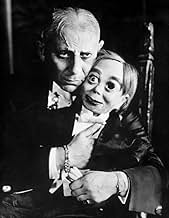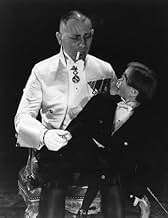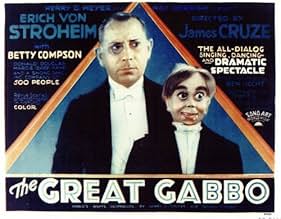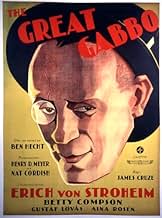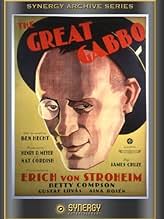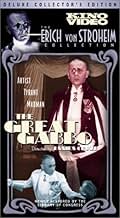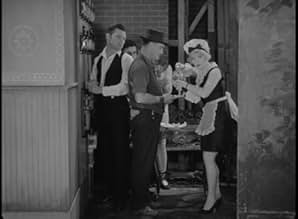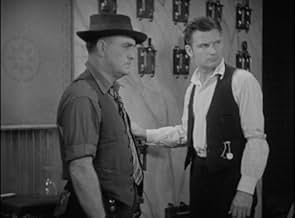NOTE IMDb
6,0/10
1,1 k
MA NOTE
Ajouter une intrigue dans votre langueAn insanely, egocentric ventriloquist, even though he is possessed by his wooden dummy, is in love with a dancer who is in love with another. The dummy gives advice to the ventriloquist.An insanely, egocentric ventriloquist, even though he is possessed by his wooden dummy, is in love with a dancer who is in love with another. The dummy gives advice to the ventriloquist.An insanely, egocentric ventriloquist, even though he is possessed by his wooden dummy, is in love with a dancer who is in love with another. The dummy gives advice to the ventriloquist.
- Réalisation
- Scénario
- Casting principal
Erich von Stroheim
- The Great Gabbo
- (as Eric Von Stroheim)
Marjorie Kane
- Babe
- (as Margie 'Babe' Kane)
George Grandee
- Otto
- (voix)
- (non crédité)
Bo Peep Karlin
- Dancer
- (non crédité)
Rosina Lawrence
- Dancer
- (non crédité)
Harry Ross
- Performer
- (non crédité)
Eddy Waller
- Vaudevillian
- (non crédité)
Marbeth Wright
- Dancer
- (non crédité)
Avis à la une
Bizarre in the extreme but a highly entertaining film about a mad ventriloquist and the woman who loves him.
Erich von Stroheim makes his talkie debut as the spooky/mad ventriloquist who often speaks through his dummy (Otto) and eventually goes totally mad. Betty Compson plays his harried assistant who is finally driven away through his cruelty and madness. But they meet up again 2 years later when von Stroheim has become a star.
We get several scenes about the masochistic relationship between the stars played out against the background of a big New York revue. There are several terrific 20s songs in this film and one unforgettable production number with Compson and Donald Douglas as a fly and spider perched on a giant web.
The film also boasts the zippy Marjorie Kane who intros "That New Step." Von Stroheim is good and has a surprisingly light accent, but Compson steals the show as the pathetic assistant who can't understand him. She also gets to sing "I'm in Love with You" and adds one more talent to her resume of skills. Compson was also a concert violinist (see INSIDE THE LINES).
Compson and von Stroheim are excellent and the whole production becomes more and more surreal as it goes on. Certainly worth a look even if one number is missing (the "Ga Ga Bird") as are the Technicolor sequences. The whole film is black and white. The number "Every Now and Then" is tops.
Compson was one of the busiest actresses in Hollyword during the late 20s and early 30s.... she's a gem.
Erich von Stroheim makes his talkie debut as the spooky/mad ventriloquist who often speaks through his dummy (Otto) and eventually goes totally mad. Betty Compson plays his harried assistant who is finally driven away through his cruelty and madness. But they meet up again 2 years later when von Stroheim has become a star.
We get several scenes about the masochistic relationship between the stars played out against the background of a big New York revue. There are several terrific 20s songs in this film and one unforgettable production number with Compson and Donald Douglas as a fly and spider perched on a giant web.
The film also boasts the zippy Marjorie Kane who intros "That New Step." Von Stroheim is good and has a surprisingly light accent, but Compson steals the show as the pathetic assistant who can't understand him. She also gets to sing "I'm in Love with You" and adds one more talent to her resume of skills. Compson was also a concert violinist (see INSIDE THE LINES).
Compson and von Stroheim are excellent and the whole production becomes more and more surreal as it goes on. Certainly worth a look even if one number is missing (the "Ga Ga Bird") as are the Technicolor sequences. The whole film is black and white. The number "Every Now and Then" is tops.
Compson was one of the busiest actresses in Hollyword during the late 20s and early 30s.... she's a gem.
THE GREAT GABBO (Sono-Art, 1929), directed by James Cruze, adapted from the story "The Rival Dummy" by Ben Hecht, stars famed director and actor Erich Von Stroheim in his talkie debut as an egotistical ventriloquist named Gabbo, or should I say, THE GREAAAT GABBO. He not only performs on stage with his dummy, Otto, (Gabbo's better half) but talks to it in his dressing room, on the street and in restaurants, with the dummy himself talking back to him, especially when Gabbo is drinking water, eating or smoking a cigarette. He has an assistant named Mary (Betty Compson), with whom he constantly finds fault in her efforts. ("My coffee is too cold/ My coffee is too hot!" etc.) During one performance she accidentally stumbles and drops a tray, which infuriates him to criticize her action, causing her to walk out on him. As time passes, Gabbo increases his fame by becoming a featured headliner in the Manhattan Revue where Mary now performs as a singer and dancer along with her new partner named Frank (Donald Douglas). In spite that he is more conceited than ever, Gabbo decides he wants Mary back with him, but something happens that will cause Gabbo to go completely insane in a dramatic climax that disrupts the show.
Aside from long stretches of dialog and no underscoring, a common practice in early talkies, "The Great Gabbo," though not considered a musical, has its share of production numbers. What makes this 1929 movie stand out among other musicals at that time is that the orchestration during the stage numbers doesn't sound at all like the usual 1920s score but more-so something from the Ziegfeld Follies. The choreography, compliments by Maurice L. Kusell, unfortunately, does not have the creativity of a Busby Berkeley, for that mainly the girls on stage simply walk back and forth carrying umbrellas, do some dancing and ballet, but there are never any closeups and the camera seldom moves or intercuts, making some of the eight to ten minute production numbers appear to be a little longer than its time length. The tunes itself, however, aren't really bad to listen to, although none of them became popular on the Hit Parade. The opening credits listing mentions sequences in Multicolor, but the entire movie itself can be seen today only in black and white.
The songs (By Paul Titsworth, Lynn Cowan, Don McNamee and King Zany) from the existing film print include: "I'm Laughing" and "The Lollipop Song-Ickey" (both sung by Otto); "Every Now and Then" (sung by Marjorie Kane and Donald Douglas); "I'm in Love With You" (sung by Douglas and Betty Compson); "The New Step" (sung by Kane); "Caught in the Web of Love" (sung by Douglas and Compton/ chorus); "I'm in Love With You" (dance number); and a finale that includes a montage of dance numbers, including the cut number of "The Ga-Ga Bird" which is shown briefly. Of all the songs, only "Caught in the Web of Love" has a slow score, but a production number that sets Douglas and Compton as human spiders dancing in front of a giant spider web. "I'm in Love With You" is one of the better songs presented in the movie, that would be sometimes edited out from some TV prints. Marjorie "Babe" Kane (famous for her role as WC Fields' daughter in the comedy short THE DENTIST in 1932) supplies some comedy, songs and taps.
THE GREAT GABBO is Von Stroheim's show all the way, monocle and all, but not the voice that accompanies his dummy, Otto. In spite of slow spots, it's an interesting drama, original in theme and premise. One wonders if Rod Serling, host of TV's "The Twilight Zone" of the 1960s, had seen this movie, since there is an episode that I recall that involves a performer obsessed by his dummy and having conversations with it, for which the dummy runs and later ruins his life and career.
I last saw THE GREAT GABBO on Cable TV's The Nostalgia Channel in the early 1990s, and it used to be one of the movies shown on Public Television's SPROCKETS back in the early 1980s. This rarely seen antique, a real curio at best, can be found on video cassette through various distributors. For a best VHS or DVD print with clearer picture and sound quality, with restored opening and exit music (but minus the reported color sequences), the best recommendation is to obtain a copy from the KINO Video Company. (**)
Aside from long stretches of dialog and no underscoring, a common practice in early talkies, "The Great Gabbo," though not considered a musical, has its share of production numbers. What makes this 1929 movie stand out among other musicals at that time is that the orchestration during the stage numbers doesn't sound at all like the usual 1920s score but more-so something from the Ziegfeld Follies. The choreography, compliments by Maurice L. Kusell, unfortunately, does not have the creativity of a Busby Berkeley, for that mainly the girls on stage simply walk back and forth carrying umbrellas, do some dancing and ballet, but there are never any closeups and the camera seldom moves or intercuts, making some of the eight to ten minute production numbers appear to be a little longer than its time length. The tunes itself, however, aren't really bad to listen to, although none of them became popular on the Hit Parade. The opening credits listing mentions sequences in Multicolor, but the entire movie itself can be seen today only in black and white.
The songs (By Paul Titsworth, Lynn Cowan, Don McNamee and King Zany) from the existing film print include: "I'm Laughing" and "The Lollipop Song-Ickey" (both sung by Otto); "Every Now and Then" (sung by Marjorie Kane and Donald Douglas); "I'm in Love With You" (sung by Douglas and Betty Compson); "The New Step" (sung by Kane); "Caught in the Web of Love" (sung by Douglas and Compton/ chorus); "I'm in Love With You" (dance number); and a finale that includes a montage of dance numbers, including the cut number of "The Ga-Ga Bird" which is shown briefly. Of all the songs, only "Caught in the Web of Love" has a slow score, but a production number that sets Douglas and Compton as human spiders dancing in front of a giant spider web. "I'm in Love With You" is one of the better songs presented in the movie, that would be sometimes edited out from some TV prints. Marjorie "Babe" Kane (famous for her role as WC Fields' daughter in the comedy short THE DENTIST in 1932) supplies some comedy, songs and taps.
THE GREAT GABBO is Von Stroheim's show all the way, monocle and all, but not the voice that accompanies his dummy, Otto. In spite of slow spots, it's an interesting drama, original in theme and premise. One wonders if Rod Serling, host of TV's "The Twilight Zone" of the 1960s, had seen this movie, since there is an episode that I recall that involves a performer obsessed by his dummy and having conversations with it, for which the dummy runs and later ruins his life and career.
I last saw THE GREAT GABBO on Cable TV's The Nostalgia Channel in the early 1990s, and it used to be one of the movies shown on Public Television's SPROCKETS back in the early 1980s. This rarely seen antique, a real curio at best, can be found on video cassette through various distributors. For a best VHS or DVD print with clearer picture and sound quality, with restored opening and exit music (but minus the reported color sequences), the best recommendation is to obtain a copy from the KINO Video Company. (**)
Though I agree with previous reviewers' comments about the good performances turned in by Erich Von Stroheim and Betty Compson, I thought the movie was disappointing overall. There isn't really much of a story, the dramatic scenes are often slow, and the rather bizarre musical numbers are poorly integrated into the plot. I'm not sure why this movie isn't classified as a musical, though; it has as many numbers as "42nd Street" and other similar titles from about the same period. Unfortunately, as a previous reviewer said, these scenes are not as creatively done as those by Busby Berkeley; the choreography is often unappealing, and the dancers don't look very well-rehearsed, though there are some bright spots.
Interestingly, the contemporary "Variety" review mentioned a color sequence in the film, which was not present on the Video Yesteryear VHS copy I watched. I wonder if this piece is lost, or available on other editions?
Interestingly, the contemporary "Variety" review mentioned a color sequence in the film, which was not present on the Video Yesteryear VHS copy I watched. I wonder if this piece is lost, or available on other editions?
If there ever was any schizophrenic example of musicals then that would be 'The Great Gabbo'. This is disturbing psychological drama interrupted by lavish and wonderful dance and music numbers. James Cruze is credited as a director but to be honest most of the non-musical scenes have von Stroheim all written over them. And not only because von Stroheim played in them but there is some sort of very specific psychologically tense atmosphere in them. It is unknown to me how much control von Stroheim had over the production but it is clear (to everyone familiar with von Stroheim's work) that he at least gave some instructions.
The film is much more than just a curiosity - two seemingly different movies, a psychological drama, and a musical tied together. Erich von Stroheim brilliantly plays brilliant ventriloquist Gabbo who is mad or driven mad by his art. When we first meet Gabbo on the screen, we see an unpleasant cruel man who in his egocentrism and perfectionism blames everyone else for his failures. After his lover and partner Mary (Betty Compson) drops the tray in the middle of the performance, he accuses her again. She leaves her but not with a light heart. Pass the two years and they both have worked their way up into Broadway. They meet again when they both appear in the same review show.
The dramatic parts concentrating on Gabbo and his relationships with other people are good but quite poorly developed. Probably because of the forceful inclusion of the musical numbers that do nothing to forward the story or even add anything to it. And this is crystal clear while watching the movie. These would have worked in a lesser amount as just a backdrop for the story. Although, I have to say the musical numbers were interesting to watch but that was the wrong movie for them. The dramatic parts are heavy and the sudden transition into the musical numbers puts the viewer off. Although the musical numbers separately are interesting I found them distracting and thus it made it difficult to follow the story.
Although the movie is inconsistent and didn't quite work, it is still worth watching especially for its uniqueness in the musical category.
The film is much more than just a curiosity - two seemingly different movies, a psychological drama, and a musical tied together. Erich von Stroheim brilliantly plays brilliant ventriloquist Gabbo who is mad or driven mad by his art. When we first meet Gabbo on the screen, we see an unpleasant cruel man who in his egocentrism and perfectionism blames everyone else for his failures. After his lover and partner Mary (Betty Compson) drops the tray in the middle of the performance, he accuses her again. She leaves her but not with a light heart. Pass the two years and they both have worked their way up into Broadway. They meet again when they both appear in the same review show.
The dramatic parts concentrating on Gabbo and his relationships with other people are good but quite poorly developed. Probably because of the forceful inclusion of the musical numbers that do nothing to forward the story or even add anything to it. And this is crystal clear while watching the movie. These would have worked in a lesser amount as just a backdrop for the story. Although, I have to say the musical numbers were interesting to watch but that was the wrong movie for them. The dramatic parts are heavy and the sudden transition into the musical numbers puts the viewer off. Although the musical numbers separately are interesting I found them distracting and thus it made it difficult to follow the story.
Although the movie is inconsistent and didn't quite work, it is still worth watching especially for its uniqueness in the musical category.
As director and actor Erich Von Stroheim did some very weird films and The Great Gabbo is certainly one of them. In this Von Stroheim is a star attraction in a Ziegfeld Follies type stage review and he is fixated on Betty Compson who used to be his assistant in his act, but walked out on him because he treated her shabbily.
Now she is keeping company with Donald Douglas a young hoofer in the show. He's actually upset as well with her interest in Von Stroheim.
In a way it's hard to review this because just the name of Erich Von Stroheim brings up images of barbaric cruelty show on the screen. The name alone is sufficient to conjure up horrible images.
So Von Stroheim wants to set up house with her and his dummy Otto. As in most ventriloquist stories the dummy functions as an alter ego.
All this with the backdrop of a Ziegfeld type show. That was interesting and like Glorifying The American Girl, The Great Gabbo is a nice filmed record of what these shows were like on stage.
Although Von Stroheim is always interesting, The Great Gabbo's best value is as a record of the type musical revue so popular back then.
Now she is keeping company with Donald Douglas a young hoofer in the show. He's actually upset as well with her interest in Von Stroheim.
In a way it's hard to review this because just the name of Erich Von Stroheim brings up images of barbaric cruelty show on the screen. The name alone is sufficient to conjure up horrible images.
So Von Stroheim wants to set up house with her and his dummy Otto. As in most ventriloquist stories the dummy functions as an alter ego.
All this with the backdrop of a Ziegfeld type show. That was interesting and like Glorifying The American Girl, The Great Gabbo is a nice filmed record of what these shows were like on stage.
Although Von Stroheim is always interesting, The Great Gabbo's best value is as a record of the type musical revue so popular back then.
Le saviez-vous
- AnecdotesThe dummy Otto was a hand carved basswood Frank Marshall figure. The same man who designed Edgar Bergen's famous characters Charlie McCarthy and Mortimer Snerd.
- GaffesOverlooking the seeming impossibility of Gabbo having Otto the Dummy speak while Gabbo is eating, smoking, and drinking, Otto's head and mouth move with the words and music when Gabbo is at least six feet away.
- Versions alternativesGabbo le ventriloque (1929) was originally released by Sono Art-World Wide Pictures, with certain sequences were presented in Multicolor. However, current prints, restored by the Library of Congress and released by Kino International on DVD, exist only in black-and-white. Most, perhaps all, VHS and DVD releases of the film have the color sequences in black and white.
- ConnexionsEdited into The Girl from Calgary (1932)
- Bandes originalesEvery Now and Then
(uncredited)
Written by King Zany and Donald McNamee
Performed by Marjorie Kane and Donald Douglas
Meilleurs choix
Connectez-vous pour évaluer et suivre la liste de favoris afin de recevoir des recommandations personnalisées
Détails
- Date de sortie
- Pays d’origine
- Langues
- Aussi connu sous le nom de
- The Great Gabbo
- Lieux de tournage
- Société de production
- Voir plus de crédits d'entreprise sur IMDbPro
- Durée
- 1h 32min(92 min)
- Couleur
Contribuer à cette page
Suggérer une modification ou ajouter du contenu manquant

